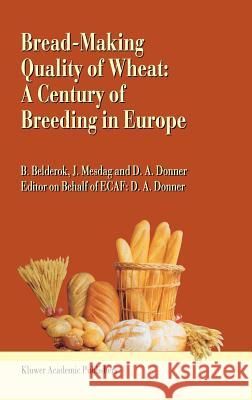Bread-Making Quality of Wheat: A Century of Breeding in Europe » książka
Bread-Making Quality of Wheat: A Century of Breeding in Europe
ISBN-13: 9780792363835 / Angielski / Twarda / 2000 / 416 str.
Bread-Making Quality of Wheat: A Century of Breeding in Europe
ISBN-13: 9780792363835 / Angielski / Twarda / 2000 / 416 str.
(netto: 813,41 VAT: 5%)
Najniższa cena z 30 dni: 848,19 zł
ok. 20 dni roboczych.
Darmowa dostawa!
Wheat has a long history of serving as an important food crop to mankind. Especially in the Northern Hemisphere, it has been appreciated as a major source of energy through its carbohydrates, and in more recent times for its supply of valuable proteins. This combination of carbohydrates and proteins gives wheat its unique properties for making breads of different kinds of tastes. During the course of history, the quality of wheat has improved stead ily, undoubtedly for a long time by accident, and for reasons little under stood. Over the last 150 years our knowledge has increased on farming and crop husbandry, on bringing about improvements through goal-oriented plant breeding, and on milling and baking technology, leading to the standards that we enjoy today. This process will certainly continue as our knowledge of the genetic reservoir of wheat species increases. The European Cereal Atlas Foundation (ECAF) maintains the aim of in creasing and disseminating knowledge about cereal crops. Within that scope ECAF has decided to publish a book on the history of bread wheat in Europe, the development of associated bread-making technology, and the breeding of bread wheats during the twentieth century. As ECAF is a Dutch foundation, its Board is particularly pleased to have found three Dutch scientists willing to contribute to this volume. Two of them have served wheat science in the Netherlands for their entire scientific careers, spanning a period starting around 1955 and lasting for several decades of very productive wheat science development."











